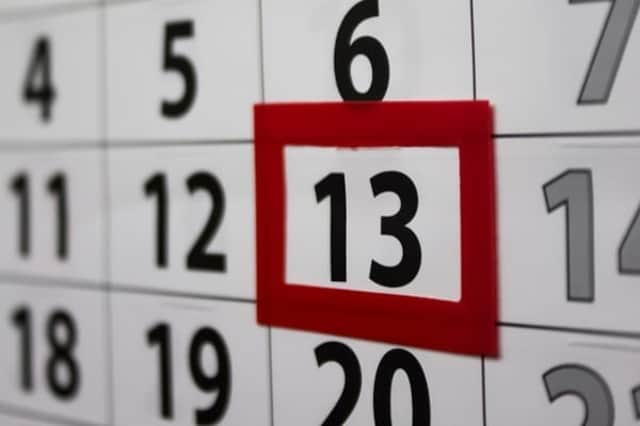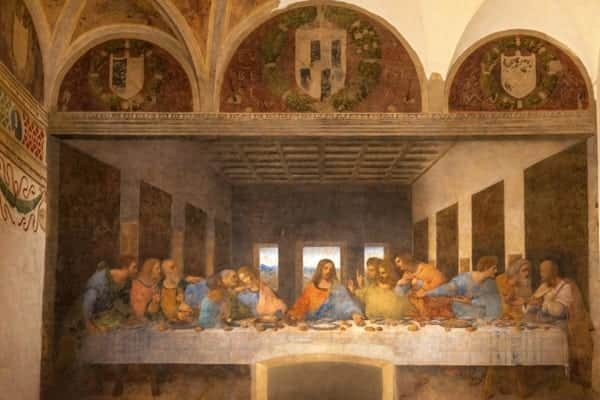This is why Friday 13th is considered to be unlucky


What are the origins of the Friday the 13th superstition, which has provided inspiration for films, novels and music over the years?
The answer is that it's a combination of two age-old superstitions.
Advertisement
Hide AdAdvertisement
Hide AdFriday is regarded as unlucky in the Christian religion, as Jesus Christ was crucified on a Friday.


Initially, followers of Christianity reserved the day for penance, and over the years the superstition grew legs. It became customary to avoid travelling or starting a new project on a Friday.
Geoffrey Chaucer referred to Friday as being unlucky in The Canterbury Tales
This notion goes back as far as the 14th century, with Geoffrey Chaucer referencing it in The Canterbury Tales - "and on a Friday fell all this mischance".
Advertisement
Hide AdAdvertisement
Hide AdFriday was also known as Hangman's Day in Britain and Ancient Rome, as it was usually the day that prisoners were put to death.


Traditionally, there were 13 steps leading to the gallows, and a hangman's noose consisted of 13 knots.
A better known superstition surrounding the number 13 also has its origins in Christianity.
At Jesus's Last Supper, 13 people were present, and some scholars have suggested that Judas Iscariot was the 13th to arrive.
Advertisement
Hide AdAdvertisement
Hide AdThe Victorians - who were fond of a superstition - amalgamated the existing aversions to both Fridays and the number 13, and inadvertently created a monster.
From the fall of man to the flood
Though suspicion surrounding the 'unlucky' date only became common during the Victorian era, some have aligned it with biblical events, alleging that both the fall of mankind and the Great Flood happened on Friday the 13th.
The first confirmed example of an unfortunate event actually occurring on Friday the 13th involved the Poor Fellow-Soldiers of Christ and of the Temple of Solomon, more commonly known as the Knights Templar.
At dawn on Friday 13th October 1307, King Philip IV ordered the arrest of members of the powerful order.
Advertisement
Hide AdAdvertisement
Hide AdOf those arrested, many were tortured and executed. Jacques De Molay, the Grandmaster of the order, is said to have cursed Philip before his execution, also on Friday the 13th, resulting in bad luck whenever the cursed day returned.
Pope Clement and King Philip died soon after.
This story has been romantically peddled in the past century, most recently being popularised in Dan Brown's bestseller, The Da Vinci Code.
Unfortunate events that happened on Friday the 13th
Friday September 13 1940: Buckingham Palace is hit with several bombs, killing one member of staff, and destroying the royal chapel
Friday October 13th 1989: The Dow Jones experiences its second largest drop, in an event known as the Friday the 13th mini-crash
Advertisement
Hide AdAdvertisement
Hide AdFriday September 13th 1996: The rapper Tupac Shakur dies of his wounds following a shooting
Friday August 13th 2010: A boy aged 13 is struck by lightning at 13:13
Friday January 13th 2012: Italian cruise ship Costa Concordia runs aground, killing 30 of those on board
Friday November 13th 2015: An ill-timed sneeze allegedly causes a film editor to delete the middle third of Star Wars: The Force Awakens
Advertisement
Hide AdAdvertisement
Hide AdProbably the country's unluckiest man
Though the exact origins of Friday the 13th are difficult to pin down, the majority of us still approach the day with trepidation.
For one man, the day is dreaded with good reason.
Bob Renphrey (a Welsh bus conductor) vowed never to leave his bed on Friday the 13th, following a string of unfortunate events in the 1990s.
He is said to have written off four cars, lost his job, fallen into a river, crashed a motorcycle, and walked through a plate glass door, in the space off several Friday the 13ths.
So if you think you're having a bad Friday the 13th - things most definitely could be worse.